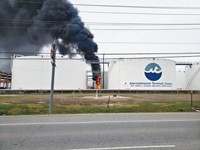Advertisement
Grab your lab coat. Let's get started
Welcome!
Welcome!
Create an account below to get 6 C&EN articles per month, receive newsletters and more - all free.
It seems this is your first time logging in online. Please enter the following information to continue.
As an ACS member you automatically get access to this site. All we need is few more details to create your reading experience.
Not you? Sign in with a different account.
Not you? Sign in with a different account.
ERROR 1
ERROR 1
ERROR 2
ERROR 2
ERROR 2
ERROR 2
ERROR 2
Password and Confirm password must match.
If you have an ACS member number, please enter it here so we can link this account to your membership. (optional)
ERROR 2
ACS values your privacy. By submitting your information, you are gaining access to C&EN and subscribing to our weekly newsletter. We use the information you provide to make your reading experience better, and we will never sell your data to third party members.
Safety
Liquefied Natural Gas Risks Assessed
Heavy damage from tanker breach could affect wide area, analysis finds
by Jeff Johnson
January 3, 2005
| A version of this story appeared in
Volume 83, Issue 1
FUELS POLICY
Serious injury and heavy property damage from fires and explosions caused by a large breach in a liquefied natural gas (LNG) cargo tank could affect areas more than one-quarter mile from the tanker ship, says a recent analysis by Sandia National Laboratories, Albuquerque, N.M.
Lesser injuries and damage could occur more than a mile from the release site, according to the report.
There are currently four U.S. marine LNG terminals, Sandia says, but more than 40 new terminals are being considered because of high U.S. natural gas use and domestic shortages, major concerns of the chemical industry. U.S. natural gas imports are expected to more than double over the next 20 years, and nearly all new gas imports will be LNG--a 28-fold increase, according to the Department of Energy. Terminals are proposed for major population centers on all three U.S. coasts.
The report models overall risk and provides approaches to limit risk of an LNG accident or intentional breaching. Risk from an accident is small and manageable with current safety practices, the report says. An intentional event--such as a terrorist attack--would cause a larger breach and do more damage, but that risk can be reduced with security planning and mitigation, according to the report.
In the past 40 years, more than 80,000 LNG carrier shipments have occurred worldwide without major accidents, the report says. Eight marine incidents have resulted in spills but no fires.




Join the conversation
Contact the reporter
Submit a Letter to the Editor for publication
Engage with us on Twitter